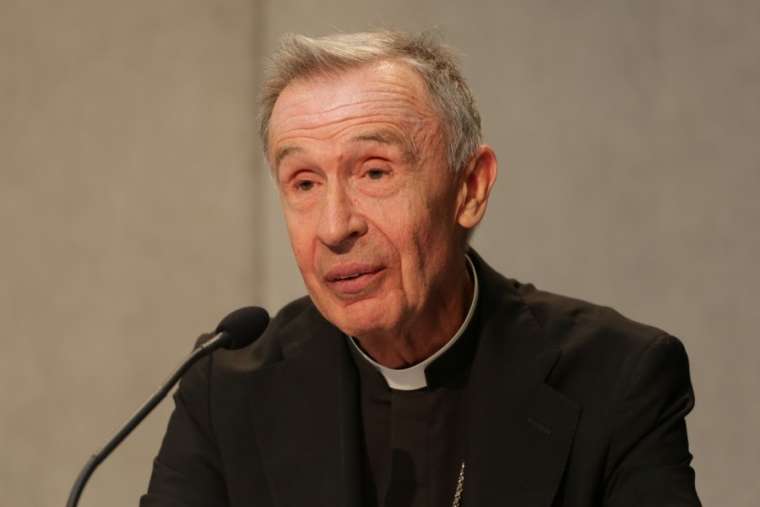The then Archbishop Luis Francisco Ladaria Ferrer at the Vatican Press Office Sept. 8, 2015. Credit: Daniel Ibáñez/CNA.
The prefect of the Congregation for the Doctrine of the Faith (CDF) said today that the Vatican had “done everything possible to dialogue” with an Irish priest barred from public ministry for his views on the priesthood and sexuality.
Speaking at a press conference at the Vatican this morning, Cardinal Luis Ladaria, SJ, argued that the CDF had no alternative but to take action against Fr. Tony Flannery.
“We have done everything possible to dialogue with Fr. Flannery. It was not always easy,” he said.
Flannery, a Redemptorist priest, was barred from public ministry by the CDF in 2012 for his stances on the nature of the sacramental priesthood and human sexuality.
It was reported earlier this month that the CDF had asked the 73-year-old to affirm four doctrinal propositions as a condition of returning to ministry.
“Fr Flannery should not return to public ministry prior to submitting a signed statement regarding his positions on homosexuality, civil unions between persons of the same sex, and the admission of women to the priesthood,” the CDF wrote to the superior of the Redemptorists in a letter dated 9 July.
Flannery wrote on his personal website: “I will not be signing this document.”
Ladaria defended his congregation’s handling of the case, telling journalists: “We have done everything possible. In some moments we have had to take some measure that never concerns a judgment on the person, because this is always reserved to our Lord, but on his teachings or on his behaviour.”
“And so we have tried always to maintain all of our respect toward Fr. Flannery, but also the duty we have, according to the dispositions of the Church, to protect the faith and therefore indicate when something is not in conformity with the faith.”
In 2010, Flannery helped to found the Irish Association of Catholic Priests, a group whose constitution emphasizes “the primacy of the individual conscience” and “a redesigning of Ministry in the Church, in order to incorporate the gifts, wisdom and expertise of the entire faith community, male and female.”
The Redemptorist leadership in Ireland reportedly wrote to the order’s superior general, who in turn wrote to the CDF, asking for Flannery to be allowed to minister publicly again.
The CDF’s letter, published on Flannery’s website, asked that the priest sign a proposition that “according to the Tradition and the doctrine of the Church incorporated in the Canon Law (c. 1024), a baptised male alone receives sacred ordination validly.”
This proposition regarding the reservation of the priesthood to men was supported by excerpts from St. John Paul II’s 1994 apostolic letter Ordinatio sacerdotalis and Pope Francis’ 2020 apostolic exhortation Querida Amazonia.
Regarding the moral liceity of homosexual acts, Flannery was asked to submit to the proposition that “Since the homosexual practices are contrary to the natural law and do not proceed from a genuine affective and sexual complementarity, they are not approved by the moral teaching of the Catholic Church.” This was supported by a quotation from the Catechism of the Catholic Church.
The priest was also asked to assent to the proposition that “The marriage covenant, by which a man and a woman form with each other an intimate communion of life and love, has been founded and endowed with its own special laws by the Creator (CCC 1660). Other forms of union do not correspond to God’s plan for marriage and family. Therefore, they are not allowed by the Catholic Church.”
This proposition on marriage was supported by the Catechism of the Catholic Church and by Amoris laetitia, Pope Francis’ 2016 apostolic exhortation.
Finally, Flannery was invited to submit to the proposition that “In so far as it contradicts the foundations of genuine Christian anthropology, gender theory is not accepted by Catholic teaching,” supported by the Congregation for Catholic Education’s 2019 document “Male and female he created them.”
In a response to the CDF letter published on his website 17 September, Flannery wrote: “From the first moment it came to me I knew that I was not going to sign it. But it has been sitting there for the last three months or so. Now it is gone, my decision has been finally made certain and clear, and there is a sense of relief and satisfaction about that.”
Speaking at a press conference on the CDF’s new document on euthanasia, Ladaria said: “This is a very unpleasant situation to the congregation, very unpleasant. But it is our responsibility, and it would be an error on our part if we did not bear this responsibility and left it to one side and did not give a word, when, in certain moments, sadly, many times it should be given.”
Source: CNA

